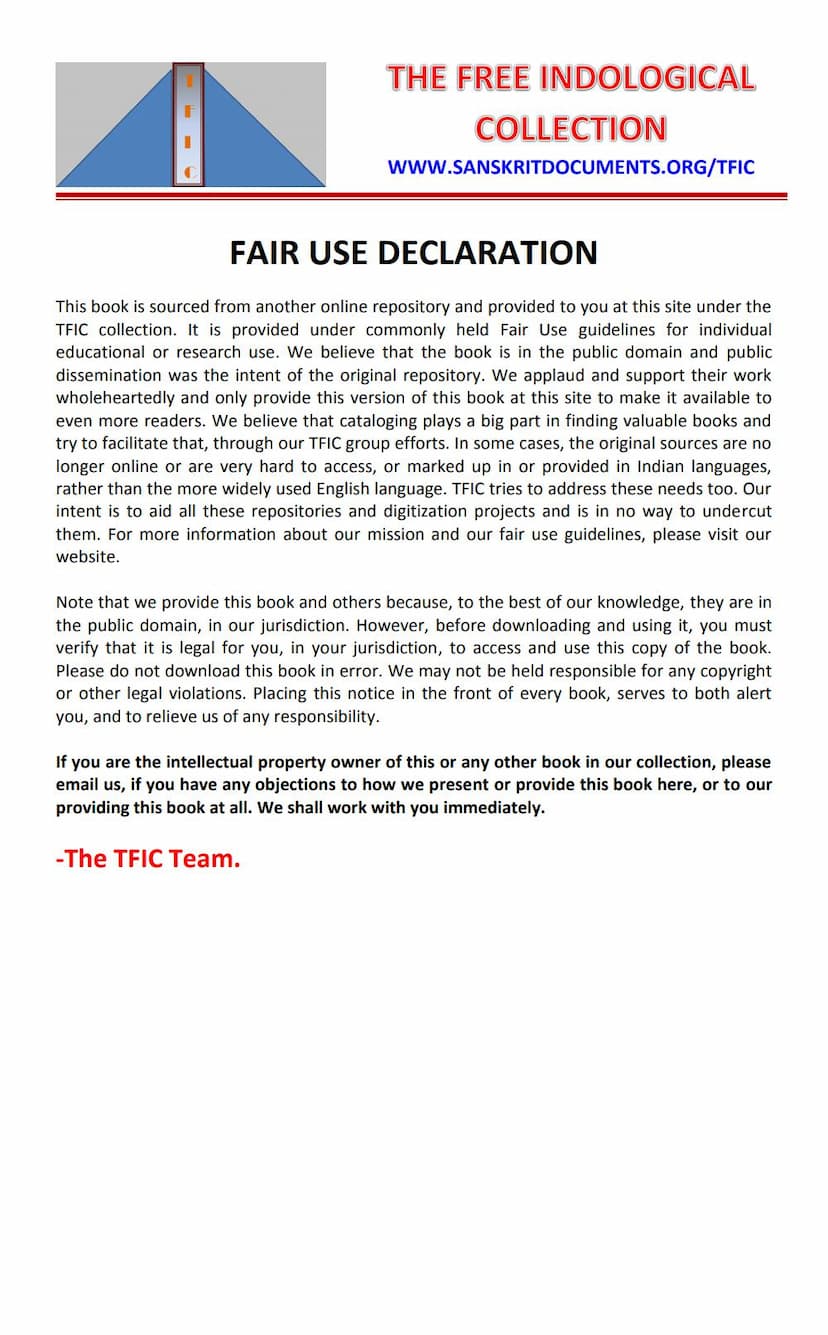Jainendra Ka Jivan Darshan
Added to library: September 2, 2025

Summary
Here's a comprehensive summary of "Jainendra Ka Jivan Darshan" by Dr. Kusum Kakkad, based on the provided table of contents and the initial pages:
Book Title: Jainendra Ka Jivan Darshan (The Philosophy of Life of Jainendra) Author: Dr. Kusum Kakkad Publisher: Purvodaya Prakashan, Delhi Catalog Link: https://jainqq.org/explore/010353/1
This book, "Jainendra Ka Jivan Darshan," is a scholarly work that delves into the philosophy of life as presented in the writings of the prominent Hindi author Jainendra Kumar. The book aims to provide a comprehensive analysis of Jainendra's unique perspective on various aspects of human existence, integrating psychological and philosophical insights with his literary contributions.
Key Themes and Chapters:
The book is structured into ten chapters, each exploring a distinct facet of Jainendra's thought:
-
Introduction to Jainendra's Philosophy of Life: This chapter sets the stage by defining philosophy and outlining Jainendra's approach to understanding life. It examines his views on existential questions, the relationship between human knowledge and circumstances, and his overall outlook on life. It highlights the significance he places on inner conviction, responsibility, love, and compassion, emphasizing self-reliance and transcending limitations of time and individual consciousness.
-
Jainendra's Views on God: This chapter explores Jainendra's belief in the existence of God, his theistic perspective, and his philosophical and scientific approach to the concept of God. It contrasts his views with those of Jain philosophy, Western thought, and modern thinkers. It discusses the idea that creation implies a creator, the limitations of logic in proving God's existence, and Jainendra's faith beyond logic. The chapter delves into his concept of God as self-existent, embodying bliss, truth, and love, and the role of faith in establishing order in life and the importance of prayer.
-
Jainendra and Religion: This chapter analyzes Jainendra's religious outlook, drawing connections to Jain philosophy. It discusses his understanding of religion's meaning and form, differentiating it from sectarism and politics. It touches upon his views on violence, his thoughts on Mahatma Gandhi and Jain philosophy, and the significance of non-possession (Aparigraha) and working for the welfare of others (Parahit). The chapter concludes with his perspective on liberation (Moksha).
-
Jainendra's View on Destiny, Karma, and Death: This section examines Jainendra's perspective on destiny, contrasting it with Western deterministic and indeterministic views. It categorizes him as a strong fatalist whose faith is rooted in belief. The chapter discusses the concept of karma, rebirth, and the significance of death as an inevitable truth, exploring its potential to lead to immortality and the fear associated with it.
-
Jainendra's Views on the Self (Aham): This chapter focuses on the concept of the self in Jainendra's literature, exploring its meaning in both Indian and Western philosophy. It analyzes his views on the self in relation to psychology, drawing parallels and distinctions with Freudian psychology. The chapter highlights the originality of Jainendra's perspective on the self, its presence in his works, and the concepts of surrender, aggression, and celibacy, as well as egoism.
-
Jainendra and Society: This chapter analyzes Jainendra's social vision, placing him in the context of the Premchand era. It discusses his views on family and marriage, love, changing societal norms, love marriages, divorce, inter-caste marriages, desire, male-female relationships, and the position of women in society.
-
Jainendra and the Individual: This chapter explores Jainendra's emphasis on the individual, his idealistic and pragmatic approach, his views on human values and life ideals. It examines his perspective on the balance between ideals and reality, the inherent incompleteness of individuals, and the respect for the oppressed. It also touches upon his psychological insights into the individual and the relationship between the individual and society, discussing values like conduct, wealth, materialism, communism, and the importance of spiritual values.
-
Jainendra: Tradition and Experimentation in Literature: This chapter discusses the importance of the novel in literature and examines Jainendra's place within the literary tradition, comparing him to Premchand. It analyzes the changing nature of literary truth and Jainendra's emergence as a significant literary figure. It highlights the interplay of the individual, consciousness, his non-reformist stance, and his aim for literature to be beneficial and spiritually uplifting.
-
Jainendra and Truth: This chapter delves into Jainendra's quest for truth, viewing it as an exploration driven by inquiry. It discusses the nature of ultimate truth, its inherent faith-based foundation, and the subjective experience of truth. It explores the practical aspects of truth, its timeless nature, and its connection to goodness and beauty. The chapter also examines the value of Jainendra's literature in accepting truth and its context-dependent nature.
-
Jainendra's Synthetical Approach to Life: This concluding chapter summarizes Jainendra's life philosophy, contrasting the analytical nature of science with the synthetical approach of philosophy. It reiterates the idea of life as an integral unit, emphasizing the indivisibility of time and space, the realization of unity, and the dissolution of the ego. It also touches upon the concept of the androgynous, the holistic nature of the mind, the unity of the material and spiritual, and the synthesis of sattva, rajas, and tamas. The chapter also links Jainendra's holistic view with Gestalt psychology.
Overall Focus:
The book is based on Dr. Kakkad's doctoral research at Allahabad University, highlighting her deep understanding of Jainendra's literary and philosophical contributions. It aims to present Jainendra not just as a novelist but as a profound thinker who grappled with eternal human questions and offered unique, psychologically insightful solutions. The work is praised for its insightful analysis and contribution to the study of Jainendra's literary and philosophical legacy.
The book emphasizes Jainendra's ability to blend intellectual depth with emotional sincerity, making his profound philosophical ideas accessible through his literature. His approach is seen as inward-looking, seeking the root of life's problems rather than just their outward manifestations, and prioritizing the discovery of truth within the individual.